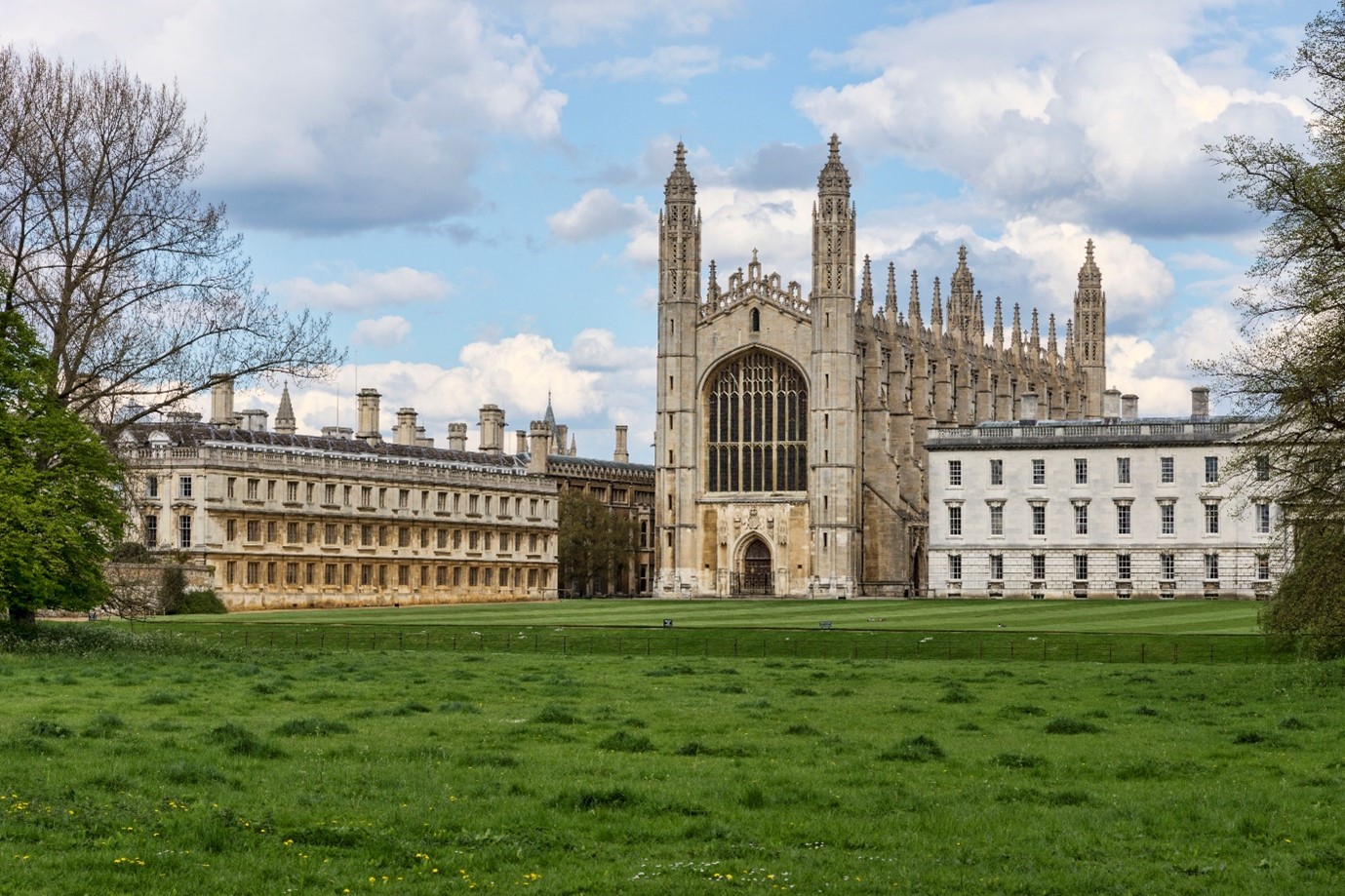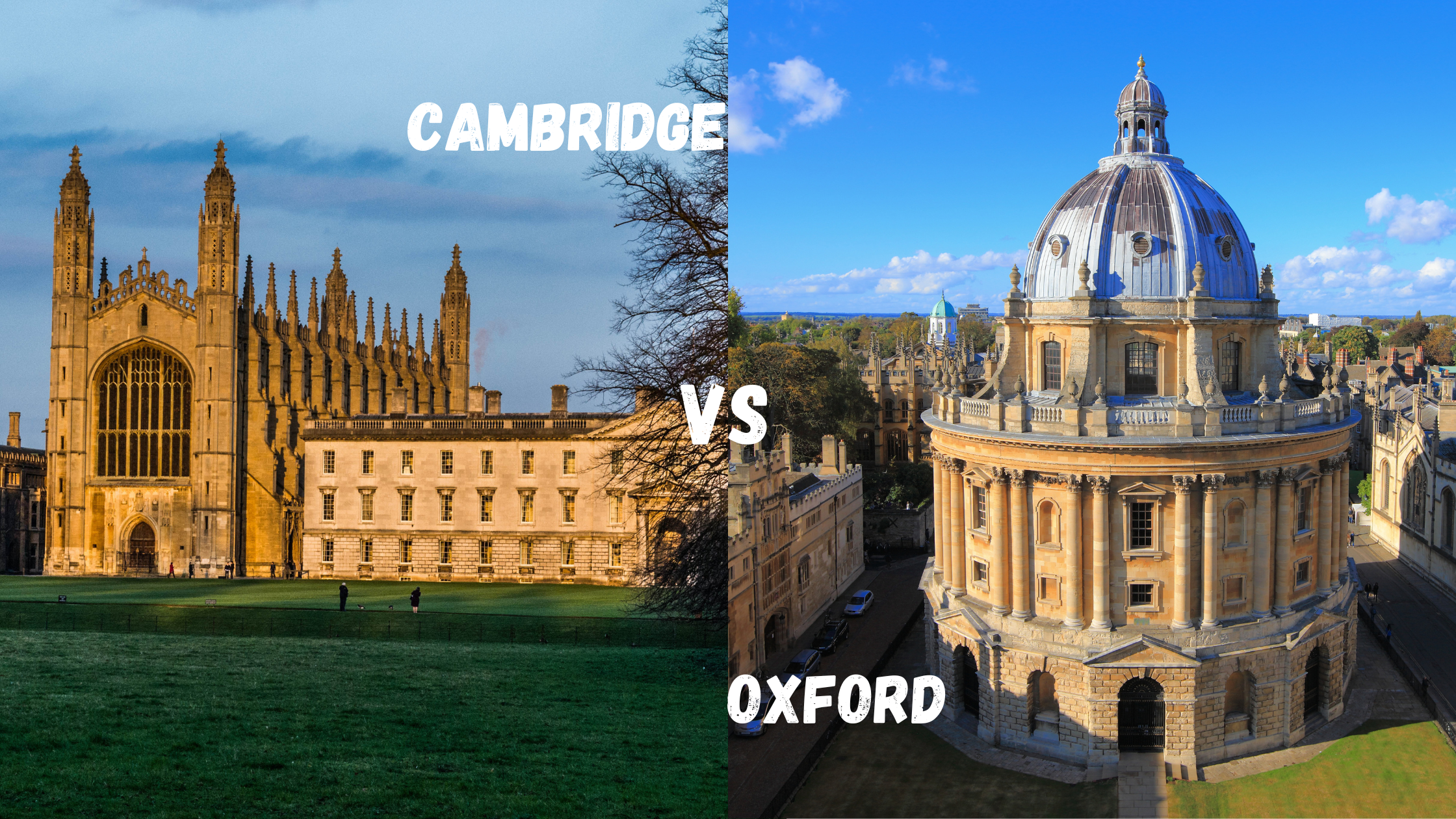Oxford vs Cambridge, two of the most well-known universities in the world, both compete to be the greatest. But which is better, Cambridge or Oxford? What’s the difference between Oxford and Cambridge? Is it the excellent academic rankings? Are there any famous alumni? Or the beauty of the architecture?
Oxford and Cambridge are often compared to decide which is better. Both are really fancy and have a good reputation. People consider factors such as how well they educate, the variety of courses available, and the quality of life there. These universities are like superstars in the educational world, and it’s exciting to see which one comes out on top in rankings and so on. But, you know, they’re both excellent, although a little expensive. Comparing both of them is like deciding between two entertaining parties, each with advantages.
Continue reading to find the differences between them to help you choose which university suits you better.
Cambridge University vs Oxford: Introduction
Cambridge
The University of Cambridge is the second-oldest in the English-speaking world and is ranked among the world’s top five universities. It is associated with the Russell Group, a network of research-led British universities; the Coimbra Group, an association of elite European universities; the International Alliance of Research Universities and the League of European Research Universities. It’s also regarded as part of the “Golden Triangle,” a geographic region of top research universities.

The university is home to over 20,000 students and 5,500 staff members from all over the world. The schools, faculties, departments, and colleges form the university. Although each of the 31 colleges has its own set of rules and regulations, they constitute an essential part of the university.
Cambridge has produced 89 Nobel prize winners, more than any other university, and Trinity College alone has produced more Nobel winners than France. The University of Cambridge is the third largest landowner in the country, following the Church of England and the King. Cambridge University courses are regarded as some of the finest in the world, and the University is one of the ten top-ranked universities in the United Kingdom by the nation’s top employers (Graduate Outcomes).
Oxford
The University of Oxford is the oldest institution in the English-speaking world and a global leader in learning, teaching, and research. It is a one-of-a-kind and historic institution. Although the date of its founding is unknown, education began in some form at Oxford in 1096 and expanded rapidly when Henry II prohibited English students from attending the University of Paris in 1167.
As of 2024, there are 32 Oxford colleges, each independent and self-governing but connected to the main university by a federal system. And there are 4 permanent private halls, which are similar to colleges but smaller. The colleges and the central university collaborate to organise teaching and research, and many Oxford employees will hold both college and academic posts.

The centre of a university is divided into several areas, including academic and administrative departments, libraries, and museums. The four academic divisions are Medical Sciences, Mathematical, Physical and Life Sciences, Humanities, and Social Sciences, and they control over 100 main academic departments. Each department organises instruction and research in several subject areas, ranging from Anthropology to Zoology. There are also other smaller, specialised research centres and sub-departments.
Oxford has educated a diverse group of popular graduates, including 28 British prime ministers and other heads of state and government from throughout the world. More than 22,000 students, including undergraduates and postgraduates, attend Oxford. Oxford University is one of the biggest providers of continuing education in the United Kingdom, with over 15,000 students enrolling in courses at the Department for Continuing Education annually.
Differences Between Oxford and Cambridge
Cambridge vs Oxford Overview
| Feature | University of Oxford | University of Cambridge |
|---|---|---|
| QS World Ranking 2026 | #3 | #5 |
| Year Founded | 1096 (Evidence of teaching) | 1209 |
| Total Students | ~26,500 | ~24,500 |
| International Students | ~12,000 (46% of total) | ~10,000 (41% of total) |
| Number of Colleges | 39 | 31 |
| Undergraduate Programs | ~48 (Distinct courses) | ~30 (Tripos courses) |
| Postgraduate Programs | ~350+ | ~300+ |
| Home Tuition (2025/26) | £9,250 | £9,250 |
| Intl. Tuition (2025/26) | £35,280 – £59,260* | £27,600 – £70,599* |
*Note: Tuition fees for international students do not include accommodation or separate College Fees. Some colleges may charge additional fees, and Medical programs generally have the highest rates.
1. Oxford vs Cambridge: University Ranking
In the QS World University Rankings® 2025, the University of Oxford is slightly ahead of Cambridge, ranking third and fifth, respectively. The differences between the institutions are typically extremely slight; as long-standing members of the global top ten, Oxford and Cambridge are well-established among the world’s higher education elites.
The Oxbridge brand is exceptionally strong, with both halves receiving top rankings in QS’s international academic and employer surveys. According to the most recent findings, Cambridge ranks second in the world for both academics and employers.
Meanwhile, Oxford has the world’s third-highest graduate employment and academic ratings.
University Ranking
| University of Oxford | University of Cambridge |
|---|---|
| 3rd QS Word University Rangkings 2025 | 5th QS World University Rangkings 2025 |
| 3rd QS Word University Rangkings 2024 | 2nd QS World University Rangkings 2024 |
| 1st Europe University Rankings | 2nd Europe University Rankings |
2. Oxford vs Cambridge: Faculty Staff Student Ratio & International Students
When it comes to the number of students per academic staff member (the faculty staff-student ratio), Oxford leads by a small percentage, although both universities are well-known for their dedication to small-group instruction and one-on-one mentoring.
Both Oxford University and Cambridge University receive good marks for international diversity. It comes as no surprise that both are well-liked by academics and students from throughout the globe. While Cambridge scores higher in the percentage of international faculty members, Oxford leads by a close margin in the percentage of international students.
3. Oxford vs Cambridge: Subjects Strength
While comparing the subjects: University of Oxford vs Cambridge, Oxford University is recognised for its excellence in the humanities subject and its world-renowned courses in the social sciences. However, Oxford University does not offer flexible science courses or degrees. Fortunately, students always have the option to apply for a joint degree in their preferred fields. And Oxford University is the top-ranked institution in English Language & Literature, Geography, History, and Modern Languages.
Cambridge University is well-known for its Natural Sciences courses. The institution also provides collaborative courses and flexible natural sciences degrees, allowing you to combine any biological or physical scientific degree. Currently, Cambridge University holds the top three global rankings in Mathematics, History, and Archaeology.
4. Oxford vs Cambridge: Living Costs
Oxford recommends that students allocate £1,290 to £1,840 for living expenses, which cover University of Oxford accommodation, food, study resources, socialising, and other expenses.
Cambridge suggests that a minimum of £11,020 per year should be allocated for living expenses, including Cambridge University housing, food, study materials, socialising, etc.
Oxford and Cambridge are more expensive than other universities in the United Kingdom. Don’t worry, though; there are ways they can assist financially. The course that you choose determines how much you must pay if you are a student from abroad. Living in these areas is expensive, especially the rent, but institutions help by lowering living costs for students. Plan your budget for living expenses, food, and books, and find out how much it costs to live there. If you are searching for affordable student accommodation, you can use the uhomes.com platform to book and find suitable housing for your studies.
5. Oxford vs Cambridge: Tuition Fees & Scholarships/Financial Support
| Feature | University of Oxford (2025/26 Entry) | University of Cambridge (2025/26 Entry) |
|---|---|---|
| Tuition Fees (Home) | £9,535 / year | £9,535 / year |
| Tuition Fees (International) | £35,280 – £59,260 / year*<br>(Science & Medicine are the highest) | £27,600 – £70,599 / year*<br>(Medicine is £70,599) |
| College Fees | Included in the tuition fee for Home students.<br>Add approx. £10,000+ for Int’l students (varies by college). | Included in the tuition fee for Home students.<br>Add approx. £10,000+ for Int’l students (varies by college). |
| Scholarships (Home) | Crankstart Scholarships and other bursaries are available for UK residents from lower-income households. | Cambridge Bursary Scheme provides non-repayable grants for UK students with household income below £62,215. |
| Scholarships (International) | Major ones include Reach Oxford and Simon and June Li. Most are for developing countries. | The Cambridge Trust offers partial funding (e.g., Rowan Williams Studentship), but full undergrad scholarships are rare. |
Basically, tuition at Oxford and Cambridge is roughly the same. Oxford has more scholarship opportunities, depending on where you are from; however, if you have a disability, Cambridge will provide you with more financial support.
Home students are eligible to apply for student financing from the UK government. These cover tuition fees and are eventually repaid after the student begins working and earning a specified amount. Full-time undergraduate UK students can also apply for supplementary loans and grants to aid with living expenses.
Several other scholarships and financial aid schemes are available at Oxford and Cambridge as well.
- At Cambridge, home undergraduates can apply for bursaries, and a variety of funding possibilities are available to students from all backgrounds.
- As for Oxford, students can look for scholarships they might be eligible for based on their studies and nationality on the Oxford website.
6. Oxford vs Cambridge: Admission Requirements
Cambridge and Oxford are selective in accepting students. Here are the requirements for undergraduates.
| Application Item | University of Oxford | University of Cambridge |
|---|---|---|
| Primary Application | UCAS (Same for both) | UCAS (Same for both) |
| Personal Statement | Required (1 statement for all 5 choices) | Required (Same UCAS statement) |
| Letter of Recommendation | 1 (Submitted via UCAS) | 1 (Submitted via UCAS) |
| Admissions Test | Yes (Pre-interview, e.g., MAT, PAT, LNAT) | Yes (Pre-interview, e.g., ESAT, TMUA, UCAT) |
| Interview | Yes (Usually in Dec, highly selective) | Yes (Usually in Dec, invites ~75% of applicants) |
| Written Work | Often Required (Arts/Humanities subjects) | Sometimes Required (Depends on college) |
| Additional Form | None | My Cambridge Application (Online form required after UCAS) |
| Resume / CV | ❌ Not Required | ❌ Not Required |
| English Proficiency | Required (IELTS/TOEFL) | Required (IELTS/TOEFL) |
7. Oxford vs Cambridge: Acceptance Rate
| Requirement | University of Oxford | University of Cambridge |
|---|---|---|
| Overall Acceptance Rate | ~15.8% | ~16.0% |
| Int’l Acceptance Rate | ~8% – 9% | ~10% – 11% |
| English Language (IELTS) | 7.5 (min 7.0 in each component) | 7.5 (min 7.0 in each component) |
| English Language (TOEFL) | 110 (min component scores: L22, R24, S25, W24) | 110 (min 25 in each component) |
| SAT Score (US) | 1480+ (Recommend 1500+) | 1500+ (Recommend 1520+) |
| ACT Score (US) | 33+ | 33+ |
| AP Courses (US) | Grade 5 in at least 3 subjects | Grade 5 in at least 5 subjects |
| IB Diploma | 38 – 40 (with 6s/7s in HL) | 40 – 42 (with 7, 7, 6 in HL) |
| A-Levels (UK) | A*A*A – AAA | A*A*A – A*AA |
| ATAR (Australia) | 98.5 – 99.5 | 98.5 – 99.0 |
| HKDSE (Hong Kong) | 5, 5, 5 in three electives | 5*, 5, 5 in three electives |
| Singapore A-Levels | AAA at H2 Level | AAAA at H2 Level |
Based on the above admissions figures, Cambridge seems to be easier to get into, especially in the process of interviews. Both universities hold interviews in December with different selection strategies. Cambridge offers interview opportunities for about 75% applicants to prove themselves in person. In contrast, Oxford filters out a significant number of applicants based on grades and admissions test scores before the interview stage.
8. Oxford vs Cambridge: Location
Oxford University is in a more vibrant and larger city, whereas Cambridge is smaller and calmer. Both universities can be easily accessed on foot from their student accommodation in Oxford or Cambridge, but many students prefer to cycle. Both are also highly scenic, with excellent old architecture and rivers running through the city centres.
Oxford also has a more hilly location, whereas Cambridge has a flat and low-lying coastal plain. The UK capital is also easily accessible from both Oxford and Cambridge. Train travel to London takes approximately one hour from Oxford and just under an hour from Cambridge.
9. Oxford vs Cambridge: Notable Alumni
Oxford and Cambridge Universities have produced an extraordinary number of influential figures in a variety of fields. Both are steeped in academic prestige and history. Their alumni are globally recognised, ranging from scientific revolutionaries to literary greats and political leaders. Here are some notable alumni from Cambridge and Oxford.
Cambridge:
- Alan Turing(Computer Science):The father of theoretical computer science.
- Charles Darwin(Biology):Known for his contributions to evolutionary biology.
- Lee Kuan Yew(Politics):Founding Father of Modern Singapore.
- Isaac Newton(Physics):One of the world’s great scientists who explained how the universe works.
- Charles III (Monarchs): King of the United Kingdom and the 14 other Commonwealth realms.
Oxford:
- Albert Einstein(Physics): One of the most influential physicists of all time, was awarded an honorary doctorate.
- Baruch S Blumberg(Scientist): Nobel Prize-winning scientist.
- Tony Abbott(Politics): Former Prime Minister of Australia.
- Tim Berners-Lee(Computer Science): The inventor of WWW(World Wide Web).
- Diran Adebayo(Literature): British novelist and cultural critic best known for his 1996 novel Some Kind of Black.
Choose the Right University: Cambridge vs Oxford
At this point, you should know the differences between Oxford vs Cambridge. The decision as to which university is better is entirely yours, as each institution offers its own advantages and both institutions are excelling in their respective fields. There are a few points that you can use to compare both of them, such as ranking, subject strength, location, living cost, alumni and financial support. After firming up your choice, you can start by finding comfortable accommodation. You can use platforms like uhomes.com that can help you find a suitable price for your accommodation.
FAQs on University of Oxford vs University of Cambridge
Which Is Wealthier, Cambridge or Oxford?
Cambridge University’s Trinity College is the wealthiest of all the colleges in Oxford and Cambridge. How wealthy? All of the British universities combined have assets of about £2 billion, whereas the assets of Cambridge University come in first place with £4 billion, followed by Oxford with £3.3 billion.
Can You Apply to Oxford and Cambridge?
No, you cannot. Oxford only allows one application per course, and applying to Cambridge and Oxford in the same year is not allowed. University of Oxford vs University of Cambridge, You can read through our detailed comparison guide to help you make the final decision.
Exams at Oxford and Cambridge Differ in What Ways?
Oxford typically grades students at the end of their first and last years, and the final-year exams determine the degree classification.
At Cambridge, students frequently take assessments at the end of each year, and these combined scores determine their final degree classifications.
Cambridge vs Oxford vs Harvard, which one is better?
According to the QS World University Rankings 2025, the ranking of Cambridge University vs Oxford University vs Harvard University is 5th, 3rd, 4th, respectively.








